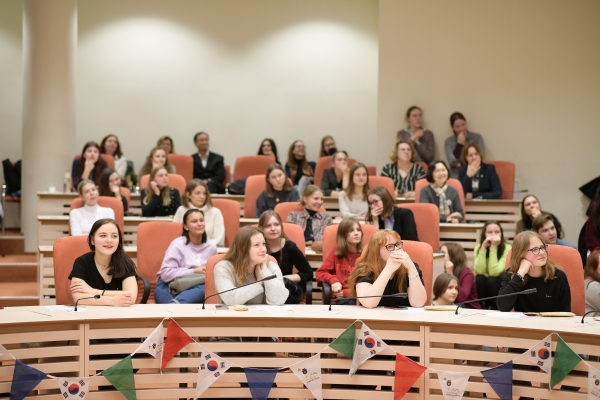
Photo provided by King Sejong Institute Foundation
Hallyu, which refers to Korean popular culture, is gaining popularity worldwide through K-pop and K-dramas. This has consequently led to increased global interest in learning the Korean language as well. In response, King Sejong Institute Foundation (KSIF) was founded to provide non-Korean speakers the opportunity to learn Korean.
KSIF is a public foundation supporting its many institute branches and managing Korean language and culture education abroad. Since 2012, the foundation has been gradually expanding and had opened up 213 institution branches in 76 countries including the United States, Vietnam and Russia by 2020.
Their mission over the years has always been to provide a more efficient way of teaching Korean and Korean culture to people from other countries. When COVID-19 struck, KSIF swiftly started to plan and produce learning materials suitable for self-study.
Last April, when KSIF had no choice but to convert the majority of its classes from in- person to online, the foundation decided to provide educational materials and programs through online platforms such as their website and YouTube.
“Although we’re unable to interact with the students face-to-face, we still had to take the education further,” said Kang Hyeon-hwa, the president of KSIF. “Thankfully, learners have been giving us positive responses.”
Earlier this year, still midway through the pandemic, KSIF launched a new program, K-Wave Korean, a compilation of short videos from famous K-dramas and K-pop songs used as Korean learning materials. The videos are available on the KSIF website and Nuri-Sejong Hakdang, as well as their YouTube channel, Learn Teach Korean.
When asked why KSIF created K-Wave Korean, she answered that Hallyu content is extremely helpful to learn Korean, since watching or listening to K-pop, K-dramas and Korean movies let students encounter Korean used in daily life.
Customized learning materials is what sets K-Wave Korean apart from other common videos regarding Korean education. The program is designed by Korean education specialists that take the learner’s proficiency level into consideration to build step-by-step learning materials. Furthermore, the videos are not only taught in English but are also provided in Chinese, Vietnamese, Indonesian, and Russian, providing even greater opportunities for students around the world to learn Korean.
Around the same time, KSIF launched an application called KSI Korean AI Tutor. The app, which is available for use on Apple and Android devices, uses voice-recognition technology and provides various dialogues and expressions that are used in everyday scenarios from school-related conversations to ordering food at a restaurant. Using the app, students can expand their learning beyond what they have read from their textbooks. The technology also helps correct pronunciation and accuracy through repeated sessions.
Kang mentioned that the foundation recognized the need for a more accessible way of learning while practicing social distancing.
“A learning platform based on artificial intelligence provides an environment where you can talk to AI teachers anytime, anywhere, and whenever you need them,” Kang said.
Citing their ongoing projects, KSIF also mentioned their plans for the future. They revealed that KSI is working on their own proficiency test, which will be on par with the Test of Proficiency in Korean (TOPIK) as a qualification examination. This means that, once the test is implemented, students who enroll in KSI for Korean education will be able to get tested, learn and take the examination all in one place.
KSIF hopes to develop localized educational materials by taking the changing needs of learners into consideration and reflecting the local needs of the foundation.
Kang confirmed that the foundation would continue to do their best to fulfill their duty of teaching Korean and spreading Korean culture.
“Studying the language and culture of other countries is not easy, but to understand each other’s different nationalities, races, and values of life is the most important and noble pursuit,” Kang said. “KSIF will help everyone who studies the Korean language and culture around the world, including Sejong Institute learners, to understand the value of language and culture.”

